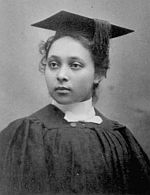From the Series "Black Women In Vermont History"
 (HOST) This week, VPR is presenting a series of stories about Black Women in Vermont History. Today, commentator Cyndy Bittinger tells about Nettie Anderson – the first black woman to graduate from Middlebury College – and first in the nation to be inducted into the national honor society, Phi Beta Kappa.
(HOST) This week, VPR is presenting a series of stories about Black Women in Vermont History. Today, commentator Cyndy Bittinger tells about Nettie Anderson – the first black woman to graduate from Middlebury College – and first in the nation to be inducted into the national honor society, Phi Beta Kappa.
(BITTINGER) Marion Annette Anderson, born on July 27, 1874 in Shoreham, was the daughter of a slave. Her father, William, left Virginia after the Civil War and, as a freed slave, met a Union soldier returning home to Vermont and joined him. William Anderson settled here, began farming and married Philomen Langlois, a Canadian immigrant of French and Indian heritage. Nettie, as Marion Annette, was to be called, was a bright child ready for a first rate education. When her parents heard of the Northfield Seminary for Young Ladies in Massachusetts, founded in 1879 for the education of those normally denied one, such as the poor and students of color, Nettie was sent there. And she flourished. She entered the diploma course, became the class president, and wrote the class poem. Only half who attended would have gone on to college. But she did, becoming the first African American woman to attend Middlebury College in 1895 and the first in the nation to be inducted into the honor society, Phi Beta Kappa.
 Commencement at Middlebury was a town holiday, and quite a day in 1899. The townspeople had seen male graduates of color in the past, about ten, but in the parade from the college to the congregational church, the class valedictorian was a woman of color with a remarkable record of achievement. She had written the class ode which they sang that day and gave an address entitled, "The Crown of Culture." Wearing her honor society key, she proudly accepted a cash prize from a Shoreham doctor who promised her this sum if she graduated at the head of her class. This she had done. The local newspaper never mentioned her race.
Commencement at Middlebury was a town holiday, and quite a day in 1899. The townspeople had seen male graduates of color in the past, about ten, but in the parade from the college to the congregational church, the class valedictorian was a woman of color with a remarkable record of achievement. She had written the class ode which they sang that day and gave an address entitled, "The Crown of Culture." Wearing her honor society key, she proudly accepted a cash prize from a Shoreham doctor who promised her this sum if she graduated at the head of her class. This she had done. The local newspaper never mentioned her race.
After graduation, Nettie taught 8th grade for a year in New Orleans and then moved to Washington, DC to teach English grammar and history at Howard University. Upon her marriage to Walter Louis Smith, she stopped teaching. She probably helped her husband in his work as the principal of Dunbar High School, the premier secondary school in the country for Black students. They maintained homes in Washington and Shoreham where she died at age 47 in 1922.
Nettie Anderson broke many barriers for women and Blacks. One scholar described her as a believer in moral existentialism; one who wanted to lift up her race and improve conditions for women.
In her Northfield Seminary class poem she compared herself to a daisy.
"The sunshine of her life she gives
To everything around her,
Though brief the season that she lives
Nor lost is her endeavor.
She is indeed the eye of day, –
Gentle, hopeful, and sweet always,
She brightens many a weary way,
The cheerful little daisy."
In a letter found in her family Bible, she also wrote, "I’d like to add some beauty to life – I don’t exactly want to make people know more – but I’d love to make them have a pleasanter time because of me – to have some better joy or happy thought that would never have been experienced if I had not been born."